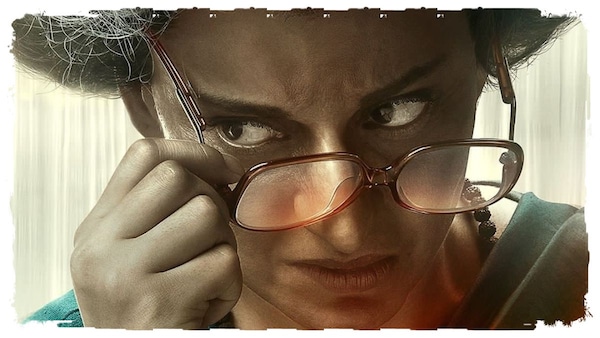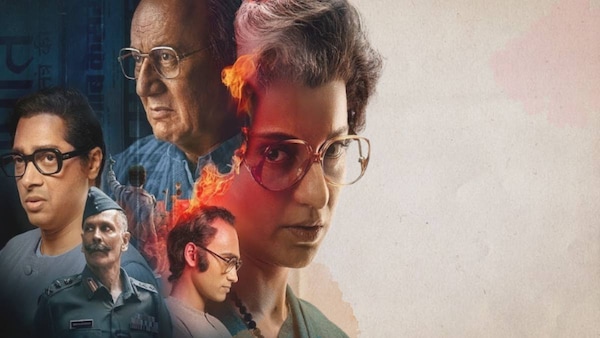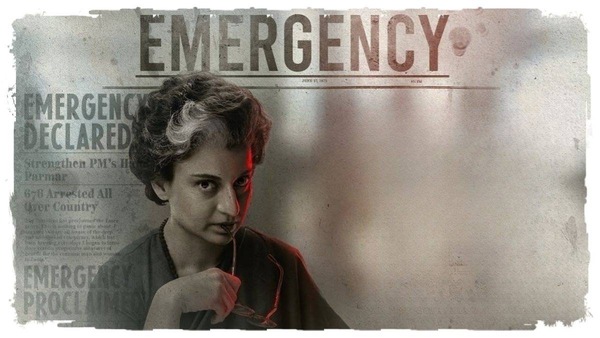Emergency: Kangana Ranaut Gets Indira Gandhi's Look, But Not Her Complexities
This is #CriticalMargin, where Ishita Sengupta gets contemplative over new Hindi films and shows.

Last Updated: 01.13 PM, Jan 17, 2025
IN THE LAST COUPLE OF YEARS there has been an upsurge of political biographies — or more correctly, hagiographies — in Hindi cinema. Facts are routinely distorted, central figures are rendered in one-note uprightness, and the past is used as a springboard to scale up the present. With Emergency, a film whose release was postponed for months, Kangana Ranaut attempts to inject criticality into the genre but she pushes the needle so far right that it takes the form of another kind of hagiography, where every leader of the opposition is depicted as a true patriot while the woman at the centre of the narrative, Indira Gandhi, is painted in shades of arrogance and power.
It is not wholly surprising. Ranaut, who has written the script and directed the film, is a member of the Bharatiya Janata Party (BJP), the opposition to Gandhi’s Congress. In the past, she has made several comments challenging the authenticity of India’s independence, mostly led by the Congress, while praising the present government for instilling bravado in people. In that sense, her segue into directing Emergency, chronicling the tumultuous time in Gandhi’s Prime Ministerial tenure — from 1975 to 1977, an era of press censorship and indiscriminate arrests — feels like a natural progression. But with the film, she also tries to make a biopic on Gandhi and the intent leaves her at the crossroads of demonising and exalting the daunting figure.
It is a baffling upshot precisely because Emergency does little to hide its agenda. The title gives it away but there are more revealing blocks along the way. With a brief flashback sequence, the film zooms ahead to a frail-looking Jawaharlal Nehru giving away Assam to China. References to Kashmir are whispered in the corridors as Indira Gandhi (Ranaut plays the titular character) halts the exodus. She returns joyous but her father is cross. Indira has stopped listening to him.

This forms the genesis of the character Ranaut has crafted (the screenplay is written by Ranaut and Ritesh Shah). In her hands, Gandhi’s character traits are heightened to a fault. She is not audacious but arrogant, not self-aware but vain, not contrite but broken. Through the ‘60s and ‘70s, national emergencies are recreated (including Hindi film in-house resident, the Bangladesh liberation war of 1971) to outline her extreme personality. Her son Sanjay Gandhi follows suit. Sanjay (Vishak Nair) is portrayed as a knee-jerk, power-hungry manic prone to breaking dishes if his egg isn’t runny enough. Emergency rests on such excess.
Politicians in Parliament suddenly break out into song at a pivotal moment, as do army chief Sam Manekshaw (essayed by Milind Soman) and Gandhi herself. The timing is the clincher. After being constantly shamed for not taking a stand in the East vs West Pakistan deadlock, Gandhi declares war. It is a historic decision (with India’s aid, East Pakistan gained liberation as Bangladesh) which leaves even her detractors impressed. Instead of including dialogues in the scene, a nationalistic song is sung.
These cop-outs are one too many and the filmmaker relies on them liberally. Gandhi’s deterioration into an egotistical leader is both sharp and sudden. Her inner turmoil is curtailed by strange creative choices where she sees a ghost as her reflection. She declares Emergency as a last-ditch attempt to secure her position and is overcome with guilt — only to be led to the ‘correct’ path of patriotism’ after having a chat with Jayaprakash Narayan (played by Anupam Kher), her staunch opponent. Later, when she loses the election, erstwhile leaders from her party (the late Satish Kaushik playing Jagjivan Ram) patiently humiliate her.

Given the lack of well-rounded biographies in Hindi films, one would feel these decisions would humanise Gandhi but they only go on to underline Ranaut’s stilted intent. Even then the heroism of India’s former Prime Minister remains embedded in the story for how intricately linked it is to her complicated legacy. Ranaut plays both sides (extreme as they are) with interesting takes. It is a heavily infected performance that relies on (inconsistent) voice modulation and is offset by the eerie resemblance. When she evokes valiance, it is all Ranaut; she slyly takes to a more exaggerated turn to portray Gandhi as a selfish leader.
The most interesting bit about Emergency, however, is that it could easily pass off as a document of today if the dates were not mentioned. The symptoms of the time are eerily similar — citizens can be imprisoned without legitimate cause, and the news has been reduced to propaganda. If nothing else, at least Ranaut’s film goes to great lengths to reiterate the great truth about history: we learn nothing from it.
Disclaimer: The views expressed in this column are those of the author and do not necessarily reflect the official policy or position of OTTplay. The author is solely responsible for any claims arising out of the content of this column.

 Premium
Premium